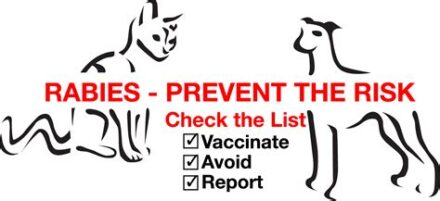Neighboring County Reports Five Positive Rabies Specimens This Year: Clinton County Residents Urged to Remain Vigilant
 Clinton County, NY, May 31, 2024. Essex County, which borders Clinton County to the south, has reported five confirmed cases of rabies in wildlife this year. Rabies is a deadly viral disease that is transmitted through the saliva of infected animals. Though no cases have been identified in Clinton County this year, the Clinton County Health Department (CCHD) felt it appropriate to alert our residents of precautions to take.
Clinton County, NY, May 31, 2024. Essex County, which borders Clinton County to the south, has reported five confirmed cases of rabies in wildlife this year. Rabies is a deadly viral disease that is transmitted through the saliva of infected animals. Though no cases have been identified in Clinton County this year, the Clinton County Health Department (CCHD) felt it appropriate to alert our residents of precautions to take.
Amanda Masten, a Senior Public Health Sanitarian at CCHD emphasizes the importance of remaining vigilant and taking necessary precautions. “Usually, rabies is spread through an animal bite; however it can also happen when infected saliva gets into an open cut, your eyes, nose or mouth,” explained Ms. Masten. “Once symptoms manifest, rabies is almost always fatal. This is why prevention measures are crucial.”
CCHD advises all residents to follow these precautions:
Ensure Pets Are Vaccinated: Ensure that all pets, including dogs, cats, and domesticated livestock, are up-to-date on their rabies vaccinations. Vaccination not only safeguards pets but also acts as a barrier against rabies transmission to humans. CCHD offers free rabies vaccinations for dogs, cats and ferrets. A full schedule of upcoming clinics can be found at www.clintonhealth.org/rabiesclinics.
Avoid Strange-Acting Wildlife: Exercise caution around wildlife, particularly if they exhibit abnormal or aggressive behavior. Do not approach or attempt to handle wild animals, even if they are injured. Teach children to do the same.
Report Suspected Cases: If you encounter a wild animal displaying unusual behavior such as aggression, disorientation, or excessive drooling, promptly notify local animal control or the health department.
By following these straightforward yet crucial precautions, residents can help reduce the risk of rabies transmission and protect the health and well-being of their families and pets. Additional information, including future Rabies Vaccination Clinic dates, can be found in CCHD’s North Country Health Effect available at http://www.clintonhealth.org/nc_healtheffect/Rabies.pdf and the latest edition of CCHD’s Talking Health Blog available at https://cchdtalkinghealth.blogspot.com/.
Posted: May 31st, 2024 under Adirondack Region News, Agricultural News, General News, Heathcare News, Law Enforcement News, Northern NY News, Peru/Regional History.
